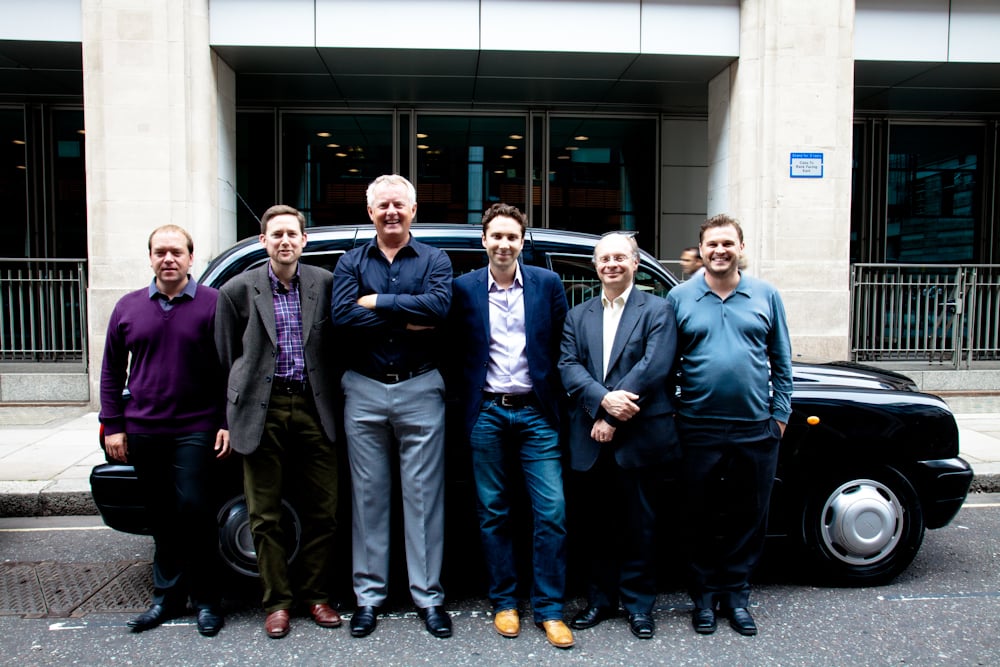We’ve all been there: it’s midnight on a Friday night, you’ve just left a boozy work function and are now stood in the street in the pouring rain, trying (in vain) to hail a cab. Your hair’s getting messed up, your Jimmy Choos are getting wet, and your disposition is becoming less sunny by the second. Now imagine a brave new world where you can wait in the warm, dry bar, nursing another vodka and tonic until your taxi arrives outside the door.
No more imagination required. Say hello to new taxi app Hailo, which is taking the hassle out of catching cabs in cities all around the world by connecting fareless cabbies with cabless punters. Simple. It’s such an obvious problem, it seems unfathomable that nobody has managed to solve it before now. And it’s not because the motivation isn’t there. Many have come, seen and failed to conquer the taxi app market. But then they don’t have Hailo CEO Jay Bregman’s stirling credentials.
Technology has been part of his life for as long as Jay Bregman can remember. Growing up in Tenafly, New Jersey, his surgeon father impressed upon him from a young age the importance of emergent technologies. “My father recognised before most people in the world that technology was going to become very important in all walks of life and it was going to have really pervasive effects on society,” he explains.
As a result, Bregman’s father always made sure he had the latest computer equipment. “I had the Commodore 64 and Commodore 128 before most people. I also had one of the first Windows computers,” he recalls. What began as a hobby as a child became a more serious pursuit at university when he took his degree in philosophy in computing at Ivy League college Dartmouth.
The technology whizzkid was at university between 1997 and 2001, a golden age of internet start-ups. “I was watching the birth of all these great companies such as eBay, Amazon and Google and I kind of felt like I was missing out on the party. By the time I graduated in 2001, the bubble had burst and the whole market had fallen apart.” At this time, the urge to start his own business became stronger, but doing what?
The following year, Bregman began a course in entrepreneurship at the LSE and reconnected with Tom Allason, an English friend he’d met at Dartmouth. After noting inefficiencies in the courier industry in the UK, together they conceived the idea for eCourier, a same-day delivery service that would be data-driven, thus ensuring a better service was delivered to customers. At the heart of the operation is ‘Larry’, a real-time optimisation algorithm that knows the location of every eCourier. When a job is logged, in a split-second Larry selects the driver that is the most well-suited to the job, based on location, traffic conditions, customer requirements and so on.
eCourier quickly gained momentum – and many an accolade. It won awards for its very clever proprietary technology, and was voted London’s most inspirational business by the Evening Standard in 2007. By the time Bregman left the business in 2010, it was turning over more than £6m and was profitable. “I had an itch to start another business,” he explains. “It had become clear to me that the business was maturing and I wasn’t going to be able to do as much of the fun and crazy stuff as I had at the beginning.”
It was almost natural that Bregman turned his attention to transporting people rather than things. “In lots of ways, taxis are the grown-up big brother to the same-day delivery market,” he says.
“It has a lot of the same dynamics. And what attracted me was the same thing as with eCourier – the prospect of solving the problem of how fundamentally inefficient it is.”
It is indeed inefficient. Hailo’s own figures show that black cab drivers spend between 30% and 50% of their time desperately looking for fares. “Whereas on the other side of the coin, consumers are finding it very difficult to get taxis,” adds Bregman. But it is more than simply marrying demand with supply: “The thing I knew from my eCourier days was creating the technology is one thing; creating the intersection of technology and humanity to get a service and a network that actually functions, given all the real-world conditions that you find on the streets of major cities, is really hard.”
And Bregman wasn’t the only person who was keen to solve this problem. He assembled some of the old eCourier team, including former COO Caspar Woolley, and Ron Zeghibe joined the fold too. But it quickly became apparent that the team were going to need input from the cabbie community if they were to build a service that would become truly indispensible.
A serendipitous meeting with three black cab drivers – Russell Hall, Gary Jackson and Terry Runham – at a café in Charlotte Street was the beginning of a golden partnership.
“It became very clear to us that these were the three guys who were going to complement the three of us; you had three people who take cabs and three people who drive cabs. Each of whom is contributing their knowledge about their side of the market to develop something that really works for both,” recalls Bregman.
It proved to be a fruitful relationship for all parties: Hall, Jackson and Runham are partners in the business. Hailo has a product that is desirable for drivers and customers and is already being used by 6,000 drivers in London and 2,200 in Dublin – and counting – with Chicago, Boston and New York to come online by the end of the year. Expansion at this rate doesn’t come cheap, which is why Hailo raised some money in March this year: Bregman and his team secured a whopping $17m in a series-A round of funding led by celebrated VC firm Accell Partners – one of the largest European first rounds in recent times.
Bregman says Hailo’s popularity is in a large part due to the fact it’s designed by drivers, for drivers. And this is a model that is replicated in every city – so when a new town comes online, Hailo will have evangelists to talk to and essentially sell the service to fellow cabbies. But, firstly, he’ll hire a really strong general manager who then helps hire three taxi drivers. There will be some localised customer support and marketing capabilities, but everything else is managed centrally from London. This includes the technology, which is localised for each city based on what the taxi drivers and the local general manager thinks is necessary. Then the app is deployed to drivers to build up the network. Once it reaches the critical mass point, Hailo is launched to customers. Hey presto.
The ease at which Hailo can be rolled out across the world is both a blessing and a curse, says Bregman. “The biggest challenge in a business like this is getting the balance right between pushing down on the accelerator and growing very quickly, without overstretching yourself and potentially tripping yourself up.” This means that Bregman has been in the unenviable position of having to say no to people asking for their city to be next on the Hailo global roadmap. “We’ve had to be very disciplined in choosing the right opportunities,” he says.
At the helm of it all, Bregman certainly seems to be doing a sterling job of steering things in the right direction. And the response from taxi drivers has been overwhelmingly positive. Modestly, Bregman attributes Hailo’s success not to his individual efforts, but those of the team. “The number one thing is having a really exceptional team of people, everywhere,” he explains. “The original idea is important, but it evolves through the people who get involved in the business. This is why you have to be uncompromising and only hire the absolute best people – whether it’s a customer service rep or a CTO.”
Hailo in practice
The cabbie’s story:
Neil Chadwick
Hailo is another pair of eyes for cab drivers – and sometimes we need all the help we can get. Hailo just gives you another option.
One of the best things about the app is that when you get jobs out to the outskirts of London, you tend to get jobs back in. Whereas, before, you were driving back in empty. So this way you double up on takings.
It can be pretty hard to convince taxi drivers to move with the times. Some are stuck in their ways, and a lot of older drivers haven’t got the phones or they’re afraid of the technology. But once you show them how to do it, they come back within a week and say it’s a breeze. It’s definitely a generational thing – the young ones love it.
I get a lot more jobs in the morning through Hailo. A lot of customers call from indoors to be picked up. I should imagine this will only increase as the bad weather sets in again. It’s fair enough really: why stand on a street when you can wait indoors?
Share via:








































